De Engelse schrijver Charles Dickens werd geboren op 7 februari 1812 in Landport. Zie ook alle tags voor Charles Dickens op dit blog.
Uit: Hard Times
“It wouldn’t hurt them, sir. They wouldn’t crush and wither, if you please, sir. They would be the pictures of what was very pretty, and pleasant, and I would fancy — —” “Ay, ay, ay! But you mustn’t fancy,” cried the gentleman, quite elated by coming so happily to this point. “That’s it! You are never to fancy.” “Fact, fact, fact,” said the gentleman. “Fact, fact, fact,” repeated Mr. Gradgrind. “You are to be in all things regulated and governed,” said the gentleman, “by fact. We hope to have, before long, a board of fact, composed of commissioners of fact, who will force the people to be a people of fact, and of nothing but fact. You must discard the word Fancy altogether. You have nothing to do with it. You are not to have, in any object of use or ornament, what would be a contradiction in fact. You don’t walk upon flowers in fact; you can not be allowed to walk upon flowers in carpets. You don’t find that foreign birds and butterflies come and perch upon your crockery; you can not be permitted to paint foreign birds and butterflies upon your crockery. You must use for all these purposes combinations and modifications (in primary colours) of mathematical figures, which are susceptible of proof and demonstration. This is the new discovery. This is fact. This is taste.” Then Mr. M’Choakumchild was asked to teach his first lesson. He went to work in this preparatory lesson not unlike Morgiana in the Forty Thieves: looking into all the vessels ranged before him, one after another, to see what they contained. Say, good M’Choakumchild, when from thy boiling store thou shalt fill each jar brim full by and by, dost thou think that thou wilt always kill outright the robber Fancy lurking within — or sometimes only maim him and distort him? The “maiming and distorting” of the imagination filled Dickens with alarm. He recognised with great clearness the law that all evil springs from misused good, and he knew that if the imagination is not cultivated properly the child not only loses the many intellectual and spiritual advantages that would result from its true culture, but that it is exposed to the terrible danger of a distorted imagination. Tom Gradgrind is used as a type of the degradation that results from “the strangling of the imagination.” Its ghost lived on to drag him down “in the form of grovelling sensualities.” That which, truly used, has most power to ennoble, has also, when warped or dwarfed, most power to degrade. As Mr. Varden told his wife, “All good things perverted to evil purposes are worse than those which are naturally bad.” The five young Gradgrinds had little opportunity to develop their imaginations. They were watched too closely to have any imaginative plays; they were not allowed to read poetry or fiction; they heard no stories; they had no fairies or genii in their lives; they heard nothing of giants or such false things; no little Boy Blue ever blew his horn for them; no Jack Homer took a plum out of any pie in their experience; no such ridiculous person as Santa Claus ever put anything in their stockings; no cow ever performed the impossible feat of jumping over the moon, so far as they knew; they had never even heard of the cow with the crumpled horn that tossed the dog that worried the cat that killed the rat that ate the malt that lay in the house that Jack built.”
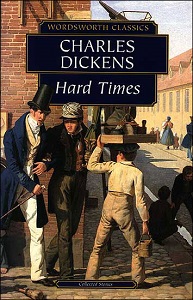
Charles Dickens (7 februari 1812 – 9 juni 1870)
Cover
De Amerikaanse schrijver en journalist Gay Talese werd geboren op 7 februari 1932 in Ocean City. Zie ook alle tags voor Gay Talese op dit blog.
Uit: Frank Sinatra Has a Cold
“I had seen something of this Sicilian side of Sinatra last summer at Jilly’s saloon in New York, which was the only other time I’d gotten a close view of him prior to this night in this California club. Jilly’s, which is on West Fifty-second Street in Manhattan, is where Sinatra drinks whenever he is in New York, and there is a special chair reserved for him in the back room against the wall that nobody else may use. When he is occupying it, seated behind a long table flanked by his closest New York friends—who include the saloonkeeper, Jilly Rizzo, and Jilly’s azure-haired wife, Honey, who is known as the “Blue Jew”—a rather strange ritualistic scene develops. That night dozens of people, some of them casual friends of Sinatra’s, some mere acquaintances, some neither, appeared outside of Jilly’s saloon. They approached it like a shrine. They had come to pay respect. They were from New York, Brooklyn, Atlantic City, Hoboken. They were old actors, young actors, former prizefighters, tired trumpet players, politicians, a boy with a cane. There was a fat lady who said she remembered Sinatra when he used to throw the Jersey Observer onto her front porch in 1933. There were middle-aged couples who said they had heard Sinatra sing at the Rustic Cabin in 1938 and “We knew then that he really had it!” Or they had heard him when he was with Harry James’s band in 1939, or with Tommy Dorsey in 1941 (“Yeah, that’s the song, ‘I’ll Never Smile Again’—he sang it one night in this dump near Newark and we danced…”); or they remembered that time at the Paramount with the swooners, and him with those bow ties, The Voice; and one woman remembered that awful boy she knew then—Alexander Dorogokupetz, an eighteen-year-old heckler who had thrown a tomato at Sinatra and the bobby-soxers in the balcony had tried to flail him to death. Whatever became of Alexander Dorogokupetz? The lady did not know.”
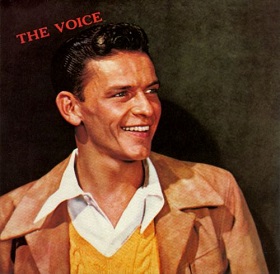
Gay Talese (Ocean City, 7 februari 1932)
Frank Sinatra
De Franse schrijfster Christine Angot werd geboren op 7 februari 1959 in Châteauroux. Zie ook alle tags voor Christine Angot op dit blog.
Uit: Un tournant de la vie
« Je traversais la rue… Vincent passait sur le trottoir d’en face. Je me suis arrêtée au milieu du carrefour. J’étais là, figée. Le cœur battant. Je regardais son dos qui s’éloignait. Torse large, hanches étroites, il avait une stature impressionnante. J’aurais pu courir, le rattraper. Il a tourné au coin de la rue. Je suis restée debout, les jambes coupées. Les yeux fixés sur la direction qu’il avait prise. Je tremblais. Je n’arrivais plus à respirer. J’ai pris mon téléphone dans mon sac, j’ai appelé une amie.
— Qu’est-ce qui se passe, t’as une petite voix ?
— Je viens de voir Vincent. Là. À l’instant. Dans la rue. Je sortais du métro, il marchait sur le trottoir d’en face. J’avais envie de l’appeler. Je l’ai pas fait.
— Il t’a vue ?
— Non.
— Il était seul ?
— Il était avec une fille. Je pense que j’aurais appelé sinon. Je suis dans un état là ! Si tu me voyais. Au milieu de la rue, avec mon téléphone. J’arrive plus à avancer.
— Tu veux que je te retrouve quelque part ?
— Ça va aller Claire, merci.
— T’es où exactement ?
— Ça s’est passé au croisement de la rue des Gardes et de la rue de la Goutte-d’Or. Je suis à deux pas de chez moi. Je vais rentrer. Ça m’a fait du bien de te parler. Je vais me calmer. Et je vais rentrer.
— Tu es sûre tu veux pas qu’on se retrouve ?
— Je pourrai pas parler. Il vaut mieux que je rentre. C’est la première fois que je le revois depuis neuf ans.
— Tu l’avais pas revu ? Depuis que vous vous étiez séparés. Tu l’avais jamais revu ?
— Jamais.
— Si vous vous revoyiez, vous pourriez être amis tu crois ?
— Je pense pas. C’est aussi pour ça que j’ai pas appelé. Il réessaierait…
— Ah oui !?
— Je me trompe peut-être, mais je pense oui… Ne serait-ce que par rivalité avec Alex… Enfin je sais pas. Franchement je sais pas.”

Christine Angot (Châteauroux, 7 februari 1959)
De Vlaamse schrijver, schilder, tekenaar, graficus, causeur, auteur, theatermaker, entertainer en zanger Pjeroo Roobjee (pseudoniem van Dirk De Vilder) werd geboren in Gent, op 7 februari 1945. Zie ook alle tags voor Pjeroo Roobjee op dit blog.
Uit: Niets te vieren
“Op stel en sprong wilde Roderick terstond de treurige mare uit zijn memorie weren. Middels enig wanbeheer in de gestie van zijn rede en begrip verhuisde in zijn klokhuis het heengaan van de bloedverwante, een besnorde tante van zijn ook al in de mistige hel van het natte Noorden toevende moeder, alras en met gemak naar de gewassen holte der vergetelheid. Tot, zowat anderhalve week na de aankomst van de doodsbrief ten kastele, Nanda in haar pathetisch omnipresente korte rokken en met verkrot gelaat nader tot hem trad en, hoe groot was zijn naar wijd en zijd uitdeinende ontsteltenis!, haar kaakgebeente spalkte om zonder dralen aan een tatering te beginnen. De hoogbejaarde minne was anders altijd even zwijgzaam. Behalve haar morgenvraag, wat ze dien dag koken moest en haar geen tegenstand duldend wederwoord wat ze dien dag koken zoude, hoorde hij verder nooit enig geklank van haar tong over het overjaars vlees harer lippen de buitenwereld binnendruppelen. En nu, ongedwongen plots en integraal redelijk miraculeus, leek het wel alsof Nanda Lumbroso’s babbelwater nimmermeer kon opdrogen. `Signore barone,’ zo luidde in het kort hertaald de complete inhoud van haar oeverloos gesnap, ‘die vuile luis van een Oreste Greppo, die cretino van mijn vunzigste voeten, awel, die en niemand anders was hier. En in al zijn staten, madre mia de Jesu de san grato, wat was hij in al zijn staten, die smerige cretino van mijn profijtig verschoond achterste portaal, quos Deus perdere vult! En ondertussen maakte hij mij al tuitend wijs dat gij, signore barone, binnen de kortste keren in het kabinet van rechter Zampone moet verschijnen om aldaar uw opwachting te maken. En hij bracht ook nog een brief in zijn afgezwijnde poten naar hier mede, die dweil, een rozig gebobbelde, met een of andere buitenlandse postzegel ontsierde enveloppe, waaromtrent dat waterhoofd van een benepen bambocheur mij wist te verklappen dat die op de griffie van de rechtbank is gearriveerd. Gepikeerd als ik was, heb ik met uw welnemen, signore barone, dat vermaledijd obsceen getint papieren ding verre van mij ergens ginderachter tegen de spiegel nedergekwakt. Of tegen iets heeltegans anders en elders.’ Met tot spleten vernauwde ogen volgde Roderick de richting die Nanda’s in het luchtruim circulerende index aanwees. Na een beestachtig lange zoektocht ontdekte hij op het marmer van de schoorsteenmantel de fameuze, wijvig bleekgeroodselde missive.”
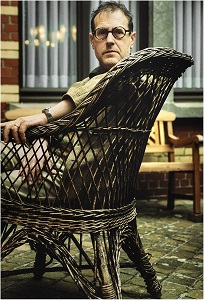
Pjeroo Roobjee (Gent, 7 februari 1945)
In 2005
De Amerikaanse schrijfster Emma Lanier McLaughlin werd geboren op 7 februari 1974 in Elmira, New York. Zie ook alle tags voor Emma McLaughlin op dit blog.
Uit: How to Be a Grown–up (Samen met Nicola Kraus)
“Marrying an actor was not something I’d set out to do.
It was, in fact, the embodiment of my parents’ worst fears—any parent’s, probably. Right up there with your child joining a cult—or having no sense of humor. Certainly for Sheryl and Randy McGovern of Oneonta, New York, this was nowhere in the plan. My parents had met at accounting school, and I’d like to be able to tell you they’re not exactly what you’re picturing—that they have a leather fetish or even high cholesterol. But they are exactly, endearingly, the people you would trust to keep you out of trouble with the IRS. So I lose a lot of time imagining what it was like for them the first day I came downstairs in the sparkly beret I salvaged from the YMCA lost-and-found and forced them to sit through my third-grade rendition of “Hey, Big Spender.”
Amazingly, they were supportive. Mystified. But supportive. Even when I decided I wanted to forgo a traditional college education to attend the performing arts conservatory at SUNY Purchase, where I discovered two unexpected things: first, set design. Second: Blake Turner.
The first time I saw him on campus, I thought I was hallucinating. I thought some potent combination of homesickness and paint thinner had conjured my teen crush, as if he were a genie sprung from the well-kissed pages of Tiger Beat magazine. I could not believe Blake Turner, the Blake Turner, was at my college.
As he slipped into his cafeteria chair in his ripped plaid shirt, dirty wool hat pulled low over his painfully beautiful features, only one sentence blared in my head: I will die if I don’t touch him. I immediately ran back to my room and called my seventh-grade best friend. Because it was 1992 and no one had e-mail yet.”

Emma McLaughlin (Elmira, 7 februari 1974)
Hier met Nicola Kraus (rechts)
De Nederlandse dichter en schrijver A. den Doolaard werd geboren op 7 februari 1901 in Hoenderloo. Zie ook alle tags voor A. den Doolaard op dit blog
Uit: De herberg met het hoefijzer
“Drie dagen later kwam Raine te Scutari aan. Zijn ganse bagage bestond uit een rugzak met zijn tekengerei, geologische instrumenten, kaartentas, wat ondergoed, een tandenborstel en een grote Steyrrevolver. De oosters uitziende stad bekoorde hem dadelijk, en hij sjouwde geduldig zijn drager na langs het blauwe bergmeer vol diepgroene drijvende eilandjes. Het was half twee in de hete namiddag, en gans Scutari scheen te slapen, op twee schildwachten voor de kazerne na, en drie in ’t wit geklede vrouwen die met gekruiste blote benen op het plaveisel zaten en Raine cocons van zijderupsen te koop aanboden. Het grote hotel was vol. Met een zucht van verlichting gaf hij zijn rugzak aan de drager, en weer slenterden zij de stoffige straten door. Op de hoek van een pleintje zonder naambord, recht tegenover een lage moskee met een afbladderende minaret, zag hij een aanlokkelijk donkere herberg. Op de rose pui stond in versleten letters ‘Grand Hotel London’. Raine lachte, betaalde de drager en ging naar binnen. Reeds sinds zijn studententijd had hij een passie voor kleine en donkere kroegen, waar hij rustig zijn benen op een tweede stoel kon leggen en zijn pijp tegen de tafelkant uitkloppen; en ‘Grand Hotel London’ zag er precies uit zoals hij het zich wenste. Bovendien wist hij uit ervaring dat hij in dit soort herbergen eenvoudige lieden uit het volk ontmoette, die hem voor het geven van inlichtingen dikwijls honderdmaal meer van nut waren dan de officiële persoonlijkheden wier namen en adressen hij netjes op een getypt lijstje meekreeg.
Rechts in de verlaten gelagkamer stond een scheerstoel bekleed met rood pluche, dat enige generaties Albanezen met ellebogen en ruggen zwartgesleten hadden. Daarboven een stel oleografieën van Mekka, Napoleon te Austerlitz, en een ijsberenjacht in de Poolzee, in lijstjes die kromgetrokken waren van de hitte. Raine plofte zijn rugzak neer en ging in de stoel zitten, om de oleografieën, die hij heimelijk liefhad, op zijn gemak te bewonderen. Tussen de kleurige prenten hing een spiegel vol vliegepoep, waarin hij plotseling zijn vertrokken gezicht zag. Hij streek ontsteld over zijn voorhoofd. Bezat hij werkelijk zoveel rimpels? Hij had nooit de gewoonte gehad zichzelf nauwkeurig te bekijken, en staarde nu verbaasd naar de diepe kerven opzij van zijn mond. Nog geen maand geleden was hij zorgeloos geweest en gelukkig. Zes weken daarvoor had hij gelachen om liefde en noodlot; en nu ontdekte hij zijn gezicht bol en bleek, in de halve schemering van de gelagkamer. Had dit afscheid hem zo aangepakt? Of was het de hitte, die hij sinds Mexico niet meer gewend was? Of zijn baard van twee dagen, die hem zo bleek maakte? Hij stampte op de vloer en riep luid: ‘Scheren!’ In de stilte die volgde, hoorde hij enkel het hoefgestamp van een paard.”

A. den Doolaard (7 februari 1901 – 26 juni 1994)
De Duitse dichteres, schrijfster en vertaalster Lioba Happel werd geboren op 7 februari 1957 in Aschaffenburg. Zie ook alle tags voor Lioba Happel op dit blog.
Du hängst mir schon lang’ zum Aug’ raus
Du hängst mir schon lang’ zum Aug’ raus
Und da hockst du auf einem Stuhl!
Und die Nacht lacht
Und ein Stern blakt –
Meinetwegen?
Deinetwegen?
Küss mich, wenn’s recht ist noch einmal –
Tick mir im Ohr!
Komm nochmal
Ohne Adjektive
Oder geh!
Ich spring auf die Beine –
Bittesehr ein Gedicht!
Tschüss, adieu, du Schmerzensreicher, Gehenkter
In meinem Nachtaug’ –
Tschüss, adieu!
Zärtlich wie du bist
Bin ich ganz rabiat!
Ich hab’ genug von dir
Ich öffne die Tür –
Draußen staubt’s!
Rechtender, Hochwohlvermögender
Dahergelaufener über die wermutblaue
& sakrosankte & Horizontlinie
Verfechten Sie doch nicht hier das rhythmisierteste
Weltenelend zur Besserung Ihres
Allgemeinbefindens, will sagen
Verzeihen Sie, ich kann keinen Reim für Sie finden
Ein Gedicht, mein Herr
ist eine Scheußlichkeit
Es hat sich der Schönheit verpflichtet
Es begnadigt nicht, ist
wie dieser strahlende Mittag über dem Meer
das böse Gewissen der Welt
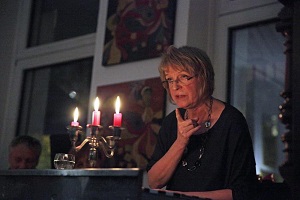
Lioba Happel (Aschaffenburg, 7 februari 1957)
De Nederlandse schrijver Rhijnvis Feith werd geboren in Zwolle en daar op 7 februari 1753 gedoopt. Zie ook alle tags voor Rhijnvis Feith op dit blog.
Droom
Schoon elk hem weerstand bood,
En jammrend van hem vlood,
Hij ’s doof voor hun gekerm.
Hij neemt ze in zijne arm,
En brengt ze, rij na rij,
Gestaag aan de overzij.
Maar nauwlijks zijn ze daar,
Of ‘k zie de blijdste schaar.
De laatste zucht vervloog;
De zielrust blinkt in ’t oog,
De jongling wordt bemind
En is hun beste vrind.
Verbaasd van ’t vreemd gezicht,
Wens ik mijzelve licht.
‘k Dring tot de jongling door.
Verleen me een poos gehoor.
Wie zijt gij? (sprak mijn wens)
Een engel of een mens?
Hij zucht, en staart mij aan.
Ik zie in ’t oog een traan.
Wat vraagt gij naar mijn naam?
Niet dat ik mij hem schaam;
Maar, (ach, hier zonk zijn blik)
Hier wekt hij niets dan schrik;
Maar ginds (zijn oog herrees)
Vervangt verrukking vrees.
Hij zucht nog eens en vlood,
En zegt: “ik ben de dood.”
‘k Ontwaak met ene gil!
’t Is alles om mij stil.
Ik vinde in ’t eind mij weer,
Ik zie op ’t mensdom neer.
Ik zie al ’t foltrend wee.
Een bloed-en tranenzee
Bruist golvend mij voorbij;
Maar ‘k zie ook de overzij,
Hare eeuwig groene kust,
Hare ongestoorde rust,
Haar eindeloos verschiet,
Dat niets dan weelde biedt, —
Dáár juicht mijn hart tot God.
Ik draag gerust mijn lot.
Zijn engel brengt ook mij
Eerlang aan de overzij!
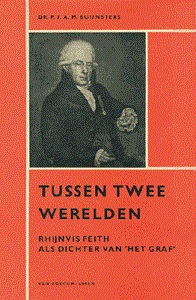
Rhijnvis Feith (7 februari 1753 – 8 februari 1824)
Cover
De Duitse schrijver Alban Nikolai Herbst (pseudoniem van Alexander Michael v. Ribbentrop) werd geboren op 7 februari 1955 in Refrath. Zie ook alle tags voor Alban Nikolai Herbst op dit blog.
Uit: Traumschiff
“Lange habe ich gedacht, dass wir einander erkennen. Aber das stimmt nicht. Wir verstehen uns nur. Dennoch lehne ich stets an der Reling des Promenadendecks, wenn die Reisegäste das Traumschiff verlassen. Und wenn die neuen eingeschifft werden, sehe ich mir jeden Menschen sehr genau an. Wie er seine Füße auf die Gangway setzt, zum Beispiel, ob fest, ob unsicher. Ob er sich am Geländer festhält.
Viele sind krank. Andere können nicht mehr richtig gehen und stützen sich auf rollbare Hilfen.
Ich möchte wissen, ob jemand das Bewusstsein schon mitbringt.
Ich habe es seit Barcelona. Das liegt lange zurück.
Einhundertvierundvierzig Passagiere von vierhundert, fünfhundert. Das ist ein Drittel, zumindest ein Viertel. Wie kann man sich da nicht erkennen?
»Vergangenheit«. Was für ein weiches Wort. »Gegenwart«. Was für ein hartes. Es bezeichnet doch alles, was ist. – Nicht aber alles auch, was war? Wissen das, frage ich mich, diese Menschen? Woran erkenne ich die, die es wissen? Erkennen sie mich?
Geht von den Neuen zufällig ein Blick zu mir hoch, schweift er meistens weiter. Als wäre ich nicht da oder niemand, der einem auffällt. Was auch stimmt. Auffällig bin ich wohl nicht. – Der einzige, der mich sofort bemerkte, und schneller als ich ihn, war Monsieur Bayoun. Dann war er abermals schneller, indem er mir vorausging.
Mein Rücken. Die Schulter. Das Bein. Von Frau Seiferts Gehstock sind unter meinen rechten Fingerwurzeln die schmalen Ballen zu Schwielen geworden. Sogar der Ring drückt. Wobei ich gar nicht weiß, wozu ich ihn noch trage. Von wem habe ich ihn? Schön ist er aber schon, mit diesem Mittwochs-Topas.
Obwohl er mir lieb ist, mag ich den Gehstock nicht.
An Monsieur Bayoun habe ich ein Gebrechen nie bemerkt. So etwas war zwischen uns kein Thema. Ich kam bei ihm auf gar nicht die Idee. So sehr hat seine Haut geglänzt, wie polierte Kaffeebohnen. Und wenn er lachte, musste man einfach mitlachen. Dann blitzten seine etwas schiefen, trotz der Cigarillos perlweißen Zähne. Er habe lange in Marseille gelebt, hat er mir erzählt. So leidenschaftlich sei sein Vater an den Unruhen beteiligt gewesen, dass seine Mutter mit ihm bis ganz nach dort habe fliehen müssen. Schieße deine Strahlen und schrecke sie! habe er oft ausgerufen.
Immer schwang ein Stolz mit, wenn Monsieur Bayoun seinen Vater erwähnte. Der meine, den ich nicht kenne, hat mich lebenslang beklemmt.“
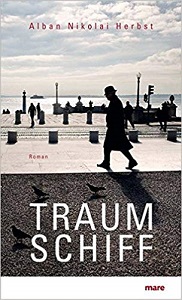
Alban Nikolai Herbst (Refrath, 7 februari 1955)
Zie voor nog meer schrijvers van de 7e februari ook mijn blog van 7 maart 2017 en eveneens mijn blog van 7 februari 2016 deel 2 en eveneens deel 3.
